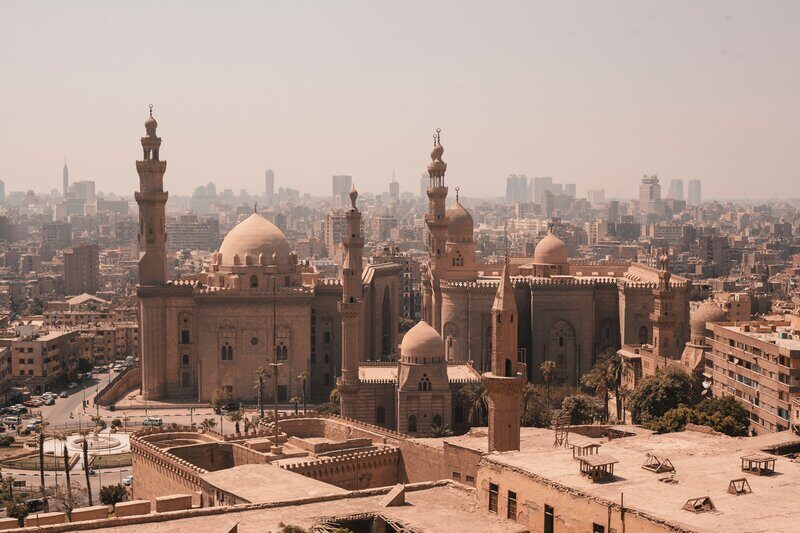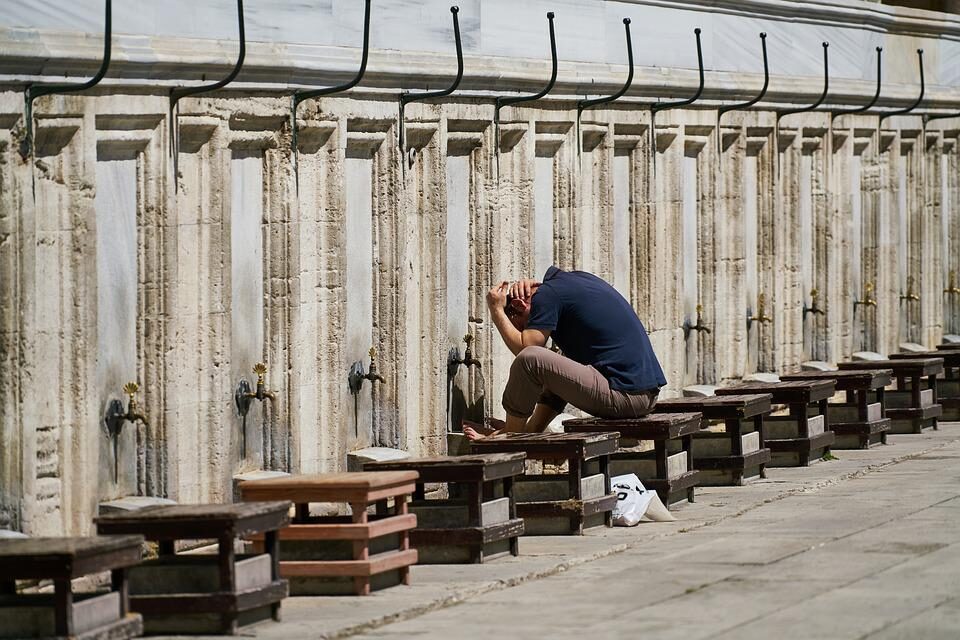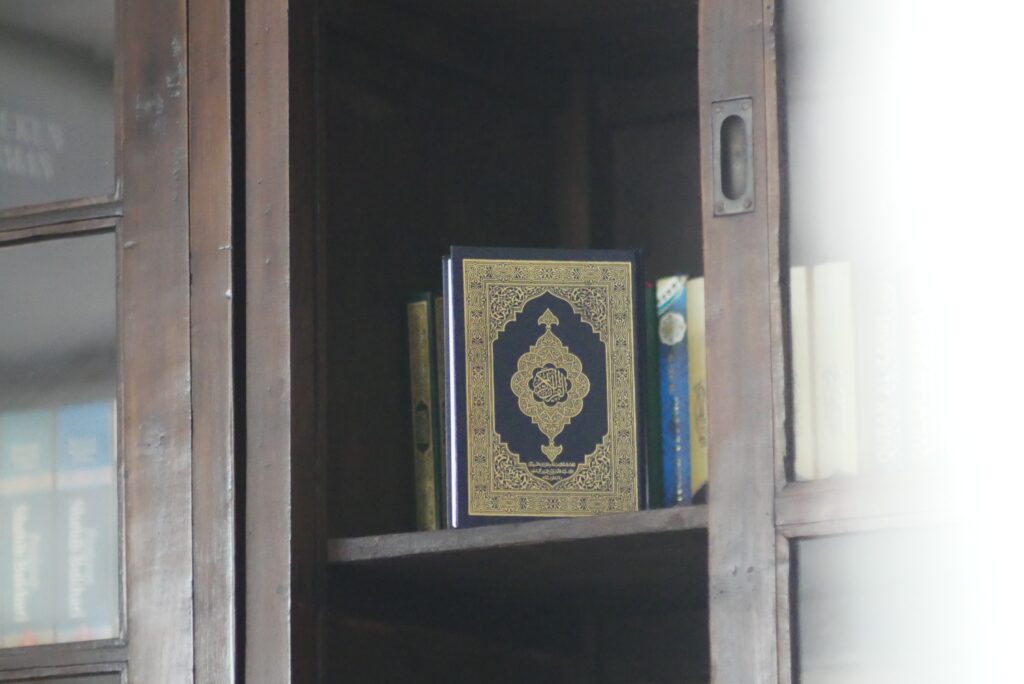Guidance regarding basic Islamic issues – which Hazrat Amirul Momineen, Khalifatul Masih Vaa has given on various occasions in his written correspondence and during MTA programmes – is being officially published below for everyone’s benefit

Qurbani on behalf of the deceased
An Indonesian Ahmadi asked Hazrat Amirul Momineen, Khalifatul Masih Vaa whether it was possible to sacrifice an animal on behalf of the deceased on the occasion of Eid al-Adha. Huzoor-e-Anwaraa, in his letter dated 8 June 2021, provided the following reply to this question:
“There is nothing wrong with offering sacrifices on behalf of the deceased, rather it is a sunnah of the Holy Prophetsa. Hence, it is mentioned in the ahadith that on the occasion of Eid al-Adha the Holy Prophetsa used to offer one sacrifice on behalf of himself and his family and one sacrifice on behalf of his ummah. And in the ummah of the Holy Prophetsa, there were also many companions who had been martyred during his blessed life. They were also included in that sacrifice offered by him [i.e. the sacrifice was also on their behalf]. (Sahih Muslim, Kitab al-adahi & Musnad Ahmad Ibn Hanbal, musnad al-ansar min musnad al-qabaail, hadith abi rafi‘, hadith no. 25937)
“Apart from this, there is also a tradition recorded among the ahadith according to which a person saw Hazrat Alira sacrificing two animals and asked the reason for it. Hazrat Alira responded, ‘The Holy Prophetsa instructed me that I should also sacrifice on his behalf [after his demise]. Therefore, I sacrifice one animal on his behalf too.’ (Sunan Abi Dawud, Kitab ad-dahaya, babu l-udhiyyati ‘ani l-mayyit)
“Hazrat Musleh-e-Maudra, while describing the special place and status that Hazrat Khalifatul Masih Ira held in his heart and the love he had for him, once said:
“‘Forty-two years have passed since the demise of Hazrat Khalifatul Masih Ira. However, I still sacrifice [an animal] on his behalf whenever it is the occasion to offer qurbani […] Later, when I went on Hajj, I offered qurbani on his behalf on that occasion too and I have continued to offer qurbani on his behalf on the occasion of every Eid till today.’ (Anwar-ul-Ulum, Vol. 25, p. 468)
“Thus, it is a sunnah of Allah’s Messengersa to offer a sacrifice on the occasion of Eid al-Adha on behalf of the deceased relatives and loved ones.”
The kinship between Hazrat Musaas and Hazrat Harunas
A lady asked Hazrat Amirul Momineen, Khalifatul Masih Vaa whether Hazrat Musaas and Hazrat Harunas were blood brothers. She also asked, how Hazrat Harunas survived when Pharaoh had ordered for all the boys of the Bani Isra’il to be killed. Huzoor-e-Anwaraa, in his letter dated 13 June 2021, provided the following reply to this question:
“The Bible suggests that Hazrat Musaas and Hazrat Harunas were blood brothers. Hence, it is written therein:
“‘And Amram took him Jochebed his father’s sister to wife; and she bare him Aaron and Moses: and the years of the life of Amram were an hundred and thirty and seven years. […] These are that Aaron and Moses, to whom the Lord said, Bring out the children of Israel from the land of Egypt according to their armies. These are they which spake to Pharaoh king of Egypt, to bring out the children of Israel from Egypt: these are that Moses and Aaron.’ (Exodus 6:20, 26-27, KJV)

Aaron surviving Pharaoh’s order for the sons of the Israelites to be killed
“According to the Bible, Hazrat Harunas was older than Hazrat Musaas. Hence, it is written therein:
“‘And Moses was fourscore years old, and Aaron fourscore and three years old, when they spake unto Pharaoh.’ (Exodus 7:7, KJV)
“It was at the time of the birth of Hazrat Musaas that Pharaoh ordered the killing of Hebrew boys on the advice of astrologers and soothsayers after having seen a dream. Hazrat Harunas survived because he was born before that.
“Another reason for the survival of Hazrat Harunas, as mentioned in the Bible, is that long after the passing of the time of Hazrat Yaqubas and Hazrat Yusufas, the population of the Bani Isra’il swell to the point that the country was filled with them. Thus, the king of that time, fearing their numbers, began inflicting all kinds of hardships on them. However, the more they were persecuted, the more their number increased. As a result, the king of Egypt ordered the midwives to kill any sons born to the Israelite women and to keep any daughters alive. However, the midwives did not follow the king’s orders. (Exodus 1:7-17, KJV)
“Moreover, it is also written in the tafasir, the commentaries of the Holy Quran, that Egyptians used to employ the Israelites without remuneration. Thus, to maintain a sufficient supply of labour, they would let any sons born to the Israelites live a year but would kill those born the following year to prevent the number of the Israelites from growing. Hazrat Harunas was born in the year in which the sons of the Bani Isra’il were spared. (Ma‘alim al-Tanzil [Tafsir al-Baghawi] by Abu Muhammad al-Husayn ibn Mas‘ud ibn Muhammad al-Farra‘ al-Baghawi, under verse 50 of Surah al-Baqarah)
“Thus, these are the various reasons for the survival of Hazrat Harunas which have been mentioned in the Bible and the books of tafsir.”
Muraqabah and meditation
Someone asked Hazrat Amirul Momineen, Khalifatul Masih Vaa about muraqabah and the teachings and methods of the Promised Messiahas regarding it. Huzoor-e-Anwaraa, in his letter dated 13 June 2021, provided the following guidance on this issue:
“Muraqabah generally denotes watchfulness, focusing, and pondering over one’s actions. This is a habit found in animals as well as humans. Hence, the Promised Messiahas says about Hazrat Junaidrh that he used to say, he had learned muraqabah from a cat. (Malfuzat [Urdu], Vol. IV, 2016, p. 147)
“Although Muslim saints and Sufis have especially occupied themselves with the method of muraqabah, it also appears in religions other than Islam, albeit in their particular ways. Hence, Hazrat Khalifatul Masih IIra writes with reference to Encyclopaedia Britannica about the Essene sect of the Jews, who have also been referred to as [a branch of the] Pharisees, that they used to fast, live pure lives and predict future events. They also used to perform muraqabah [i.e. meditation] at the time of worship so that their souls may be connected with the Heavenly Father. (Tafsir-e-Kabir, Vol. IV, p. 384, column no. 2)
“The main purpose of Islamic worship is to create a close relationship between man and God. Hence, the Holy Prophetsa defined ihsan in response to an individual’s question and said:
أَنْ تَعْبُدَ اللّٰهَ كَأَنَّكَ تَرَاهُ، فَإِنْ لَمْ تَكُنْ تَرَاهُ فَإِنَّهُ يَرَاكَ
“‘[Ihsan is] to worship Allah as if you see Him, and if you do not achieve this state, then at least that Allah sees you.’ (Sahih Bukhari, Kitab al-Iman, Babu Su’ali Jibrila n-Nabiyysa […])
“These two states of worship are forms of muraqabah. Thus, Hazrat Musleh-e-Maudra, while describing the wisdom behind salat, says:
“‘In fact, salat teaches us that three things, namely cooperation with others, preaching or admonishing and muraqabah, are necessary for the perfection of the human soul. The substitute for muraqabah are the silent prayers [salat], the intensity of which one can increase to suit one’s taste.’ (Daily Al Fazl, Qadian, 5 September 1936, p. 4)
“Explaining the method of muraqabah and its benefits, Hazrat Musleh-e-Maudra says:
“‘We have a situation in our country in which people jump from one idea to another, then to another and then to yet another as a monkey jumps about trees. This applies to all aspects of life. There is a lack of determination. For this reason, the most excellent teachings of the Holy Quran and the Hadith are not internalised by them, as they quickly jump from them and move on. (The Holy Prophetsa said muraqabah was the treatment for this. The Sufis have developed some practical methods for its implementation, but who cares about it in this material age!) […] Muslim preachers have also not utilised this treatment i.e. internalising the teachings of the Quran and the Hadith related to these matters, which is also called muraqabah and repeatedly preaching them to the people. Rather, instead of admonishing people that their morals should be reformed, all that is said is ‘Observe the salat and fasting, perform prostrations like this, use cleansing stones [or toilet paper] like that; your act of using the stones cannot be correct unless you perform certain movements with the stone at least seven times etc. etc.’ In short, the emphasis is placed on the outer form or the rituals, and the real lesson behind these commands is completely ignored.’ (Anwar-ul-‘Ulum, Vol. 24, p. 515)
“While advising the members of the Jamaat regarding muraqabah, Huzoorra said:
“‘You should also develop the habit of quietly spending some time every day in the remembrance of Allah [zikr-e-ilahi] and performing muraqabah. By zikr-e-ilahi’ I mean setting aside some time daily in addition to the daily salat etc. even if it is only five minutes in the beginning. [This time should be utilised] to sit quietly in solitude and to do tasbih and tahmid by repeating, for example, SubhanAllah, Alhamdulillah, Allahuakbar and similarly other attributes of Allah and reflecting over them.
“‘Muraqabah means to sit in solitude for some time daily and take account of one’s own self and to see what mistakes one has committed; whether one can distance oneself from them or not, if one can, why one has not done so, if one cannot, what are the reasons and what can be the solution. Then, moving forward, one can think about the reformation of one’s loved ones and neighbours. Also, what are the effective sources of preaching, what are the obstacles and how can they be removed? The result of this kind of self-analysis should be written down in form of a diary and this process should then be expanded.
“‘If the habit of zikr-e-ilahi and muraqabah is inculcated in this manner, it will certainly grow one’s spirituality, sharpen the intellect and increase one’s ability to ponder over and act upon the instructions and addresses of the Imam-e-Waqt [the Khalifa]. Such a person would gradually become a spiritual doctor and a reformer for the world in a limited way.’ (Anwar-ul-‘Ulum, Vol. 23, pp. 61–62)
“The Promised Messiahas explained the true method of muraqabah and its benefits to his followers and stated:
“‘Be devoted to Allah the Exalted with all your body, mind and spirit. Then God Almighty will automatically become the Protector, Helper and Guardian of all of you. All of man’s faculties — eyes, ears, heart, mind, hands and feet — should be devoted to Allah as one unit. There should be no disagreement between them. Therein lie all the successes and victories. This is the real muraqabah. This is what creates warmth in the heart and spirituality. And perfect faith is attained through this.’ (Malfuzat [Urdu], Vol. V, 2016, p. 320)”
Renewing wudu

Someone asked Hazrat Amirul Momineen, Khalifatul Masih Vaa whether it was necessary to perform istinja’ when renewing wudu upon having passed wind. Huzoor-e-Anwaraa, in his letter dated 22 July 2021, provided the following reply to this question:
“There is no mention of doing istinja’ before wudu anywhere in the lived example of the Holy Prophetsa nor in his statements wherein he has described the details of wudu. Therefore, if one’s wudu is invalidated due to having passed wind, there is no need to perform istinja’ before renewing the wudu for salat. However, if any faecal matter or urine have also been discharged with it, then it becomes necessary to perform istinja’ before wudu so that any impurity can be washed first. Otherwise, if one has done istinja’ once after relieving themselves and performed wudu, then it is not necessary to perform istinja’ again after passing wind in order to renew the wudu.”
Milk al-yamin: Marrying ‘those whom your right hand possess’
A murabbi asked Hazrat Amirul Momineen, Khalifatul Masih Vaa which women were referred to in the following verse:
وَّالۡمُحۡصَنٰتُ مِنَ النِّسَآءِ اِلَّا مَا مَلَكَتۡ اَيۡمَانُكُمۡ
He further asked whether one was allowed to marry those women even though they were already married, or was this verse for a specific time and had now been abrogated. Huzoor-e-Anwaraa, in his letter dated 22 July 2021, provided the following guidance on this issue:
“You are a murabbi and yet you do not know that no verse of the Holy Quran can be abrogated. From your question, it appears that you have neither studied the books of the Promised Messiahas nor those of Hazrat Musleh-e-Maudra, nor do you listen to the sermons and addresses of the Khulafa-e-Ahmadiyyat. Rather, you do not even know the basic beliefs of the Jamaat. Hence, you are asking whether this verse of the Holy Quran has been abrogated. It is a fundamental belief of the Ahmadiyya Muslim Community that the Holy Quran is the Word of God, which He has taken upon Himself to guard and that its entire text from the ba of the basmalah to the seen of wa n-nas is protected by the command of God Almighty and is immutable to the extent that not a dot, nay, not even an iota, of it can be abrogated. Moreover, just as the Holy Quran was pertinent 1400 years ago, it is still applicable and will continue to be practicable until the Day of Judgement, insha-Allah.
“Yes, it is true that some commands of the Holy Quran are related to specific situations. When those situations arose during the lifetime of Holy Prophetsa such commands were applied to them. Should the same conditions arise again in the future, then these commands will be implemented under them. The commands regarding female prisoners of war described in the verse under discussion are also specific to similar situations.
“A murabbi’s job is not only to find answers by just submitting questions [to others] or to merely resort to Google search to find out something. Instead, a murabbi should have the habit of conducting his own research to increase his knowledge. His knowledge should be firm and deep, he should pay meticulous attention to the study of Jamaat books and other scholarly works and he should have the habit of contemplating and deliberating on them to extract new scholarly insights.
“As far as the question related to women in the above-mentioned verse is concerned, [one should remember that] in the early stages of Islam, the enemies of Islam would make Muslims a target of various kinds of atrocities. If they got hold of the wife of a poor and oppressed Muslim, they would include her among their wives as a slave.

“Hence, in accordance with the Quranic injunction of جَزٰٓؤُا سَيِّئَةٍ سَيِّئَةٌ مِّثۡلُهَا [‘the recompense of an injury is an injury the like thereof’], such women who came along with an assailing army against Islam in order to support them would be taken captives as prisoners of war in accordance with the custom of that era. Then, if such women did not earn their freedom by paying the ransom or through the method of mukatabat [an agreement between a slave and master, where the slave offers to pay their own monetary value in order to be set free] they would be distributed among the army as there were no royal prisons etc. to hold such prisoners of war in those days. These soldiers were responsible for meeting the needs of the female prisoners of war who came into their possession such as housing, food and clothing etc. So, in return, according to the custom of that era, these soldiers had full right to benefit from them, which included having a physical relationship with them. Therefore, in this verse, the same kind of women of the enemy are mentioned. If they came into the possession of the Muslims under the above-mentioned circumstances as female prisoners of war, regardless of whether they were married or unmarried, it was permissible to have conjugal relationships with them.
“Here, I should also make it clear that in the light of the Holy Quran, the ahadith and the sayings of the Promised Messiahas, my position is that conjugal relations could be established with those female prisoners of war only through nikah. Nevertheless, their consent was not required for this marriage, nor was the consent of a wali, as is mandated in Islamic law, necessary for such marriage. Rather, as was the practice in many tribes and societies of the past, and is still practised in some countries that it is only pronounced in the society that ‘we are husband and wife’ and this is a kind of ‘nikah announcement’, in the same way, the act of [public] distribution of such female prisoners of war along with other spoils of war to the soldiers was considered a kind of ‘nikah announcement’. Moreover, a nikah to such a woman did not affect the permission for a man to rightfully marry up to four [free] women. In other words, a man could perform nikah with such a woman despite being married to four [free] women. However, if the female prisoner of war bore a child, she would become free as a result of being the mother of that child [umm al-walad].”
(Compiled by Zaheer Ahmad Khan, Head of Records Department, Private Secretariat, London. Translated by Al Hakam)

